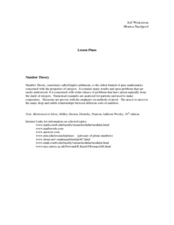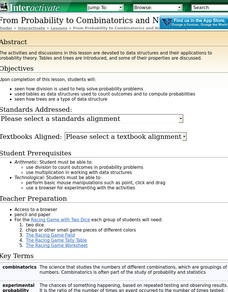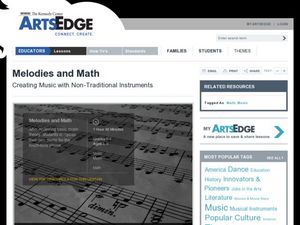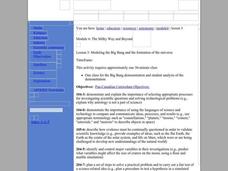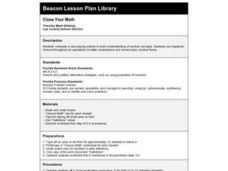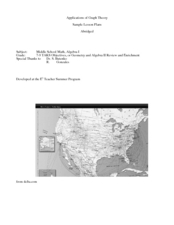Curated OER
Number Theory
Learners explore the concept of number theory. They discuss an assortment of number theory topics such as prime numbers, composite numbers, GCF, modular arithmetic, and others in a lecture style discussion. Pupils view videos about these...
Diablo Valley College
The Language of Sets and Set Notation
The basics of number theory and set notation are explained in a highly approachable way in a self-contained lesson and worksheet. Introducing the vocabulary and concepts from ground zero and building to more complex ideas of subsets...
Scholastic
Optical Illusion
Number theory gets a workout in an activity that asks individuals to identify and color code the prime numbers and the composite numbers in the provided graphic.
Beacon Learning Center
Ten Pins
Multiplying with multiples of 10, 100, and 1,000 provides an opportunity to discuss patterns that arise with zeros. The class uses these patterns to solve problems. Then they rotate through three work stations, including a computer-based...
Curated OER
Number Theory - Week 12
In this number theory worksheet, students study integers and their properties. They explore the Fibonacci Sequence and approximate irrational numbers. This two-page worksheet contains eight problems.
Shodor Education Foundation
From Probability to Combinatorics and Number Theory
What middle schooler does not enjoy an occasional online game? In this lesson plan play, you will find embedded links to an online probability game, and informative pages about how division is used in probability, the concept of tree...
Curated OER
da Vinci: Body Proportion Theories
Middle schoolers investigate the validity of da Vinci's proportion theory by recording human measurements on scatter plots. In groups of three, they record each other's height and wingspan to create a Powerpoint presentation, chart, or...
Curated OER
Two-Step Problems and Money Concepts
Elementary schoolers solve two-step equations and practice money concepts. They solve multi-step addition and subtraction contextual problems and apply money concepts to real life situations. Pupils use pictures and counters to help them...
Curated OER
Rhythm, Math, Rhythm
Students play instruments in math class to learn the interconnectedness between math and music. In this math lesson, students subdivide a piece of music, clapping rhythms and charting rhythm patterns in the song. A guided discussion...
Penn Museum
Ancient History Math Mystery
Through several organized and attractive worksheets, your learners will make a deduction about tally marks and hieroglyphics to determine what they represent in the ancient numeral system. This is a well-designed, interdisciplinary...
Curated OER
Melodies and Math: Creating Music with Non-Traditional Instruments
Review the 4/4 and 2/4 time signatures in music with a helpful music theory lesson plan. Young musicians experiment with electronic sounds and create their own musical performance using instruments made from materials found in the...
Curated OER
Divisibility Rules Using Scientific Calculators
Young learners apply divisibility rules to determine if a number is a factor of another number. They discuss what numbers are factors of another number and identify patterns using divisibility rules.
Curated OER
The Big Bang Theory
Students will use scientific reasoning to formulate ideas about the formation of the universe using the Big Bang Theory. The use of critical thinking skills is part of the activity and the foundation of the scientific method will serve...
Curated OER
One Size Fits All, Part 1
Can you tell how tall someone is just by looking at their feet? In this activity, young mathematicians measure their height, arm span, and foot size, graph their findings, and answer questions about how these measurements are related....
Curated OER
Factor Game (Number Theory)
Young scholars use a Factor Board game to identify the properties of prime, composite, abundant, deficient and perfect numbers. The game is comprised of the numbers from 1 to 30 placed in a 5 by 6 grid. Pupils figure out they can score...
Institute of Electrical and Electronics Engineers
Coloring Discrete Structures
What's the least number of colors needed to color a U.S. map? The lesson begins by having pupils view a video clip on continuous and discrete phenomenon, then launches into an activity reminiscent of Zeno's paradox. A separate video...
Curated OER
Proving (a Theorem) and Disproving (a Theory)
As a cross-curricular instructional activity, your class examines the issues of gender discrimination, careers, and gender roles. They read and discuss an article, prepare a proof of the Pythagorean theorem as a class, and develop a...
Curated OER
Geo Jammin' By Design - Day 7, Lesson 38: Kool Cups
Create geometric cups by interpreting directions, informational text, and mathematical concepts. Critical thinkers apply geometric theory (congruent shapes, patterns, symmetry) to actual directions to create a cup that holds Kool Aid....
American Statistical Association
Chunk it!
Chunking information helps you remember that information longer. A hands-on activity tests this theory by having learners collect and analyze their own data. Following their conclusions, they conduct randomization simulations to...
Curated OER
Euclidean Algorithm
High schoolers are introduced to the concept of a Greatest Common Divisor. They review the number systems. Students are told how the entire field of Number Theory primarily uses the integers. They are told the Fundamental Theorem of...
Curated OER
Close Your Math
Fourth graders complete a role playing activity to build understanding of number concepts. They use Algebraic Closure throughout six operations to better comprehend and review basic number theory. They utilize a worksheet imbedded in...
Education Closet
Equal Rhythms
Engage young mathematicians in learning about fractions with this cross-curricular math and music lesson. After listening to and repeating different beat patterns, children realize that musical notes are just another way of representing...
Curated OER
Application of Graph Theory
Students investigate different online tutorials as they study graphing. In this graphing instructional activity, students apply the concept of graphs cross curricular and use it to make predictions. They define the purpose and theories...
Space Awareness
History of the Universe
Your pupils may believe that you and their parents are the oldest things in the universe, but surprise! There are elements of the universe that are even older. Elementary scientists create a class timeline to demonstrate the...


